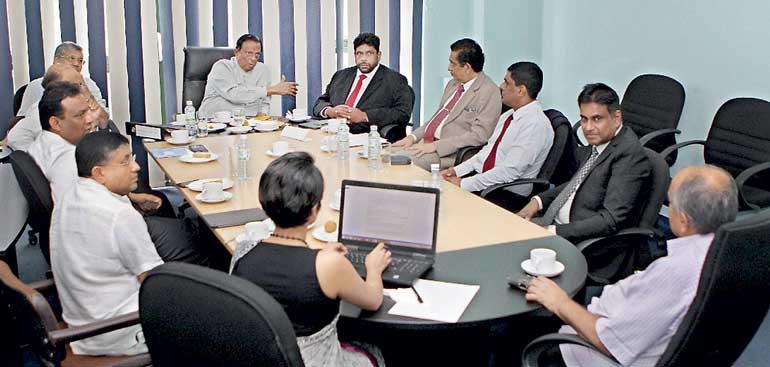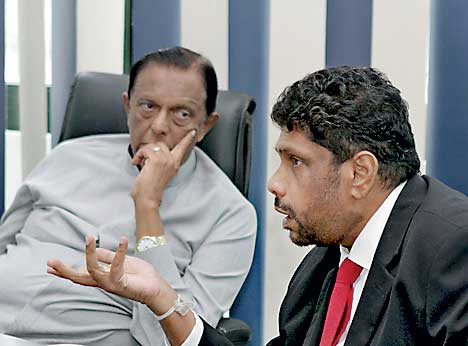Thursday Feb 26, 2026
Thursday Feb 26, 2026
Wednesday, 18 November 2015 00:00 - - {{hitsCtrl.values.hits}}

Minister of Tourism Development John Amaratunga, Medical Tourism Council Chairman Dr. Rohan Wijesundera, Lanka Hospitals Chairman Dr. Sarath Paranavitane, Lanka Hospitals Director Keith Bernard, Vascular and Transplant surgeon Professor Mandika Wijeyaratne, Nawaloka Hospitals Director Professor Lal Chandrasena, Central Hospital Director Nihal Ratnayake, Hettigoda Group Director Asoka Hettigoda, Sri Lanka Conventions Bureau Chairman Prema Cooray, Private Secretary to the Minister Lal Rathnayake, Senior Advisor to the Minister Felix Rodrigo and Personal Assistant to the Minister Anne Amaratunga
The inaugural meeting of the Council for the Promotion of Medical Tourism was held with the auspices of Minister of Tourism Development John Amaratunga recently. The meeting was attended by Dr. Rohan Wijesundera, who was appointed as the head of the Council, Lanka Hospitals Chairman Dr. Sarath Paranavitane, Lanka Hospitals Director Keith Bernard, Vascular and Transplant surgeon Professor Mandika Wijeyaratne, Nawaloka Hospitals Ltd. Director Professor Lal Chandrasena, Central Hospital Ltd. Director Nihal Ratnayake, Hettigoda Group Director Asoka Hettigoda, Sri Lanka Conventions Bureau Chairman Prema Cooray, Private Secretary to the Minister Lal Rathnayake, Senior Advisor to the Minister Felix Rodrigo and Personal Assistant to the Minister Anne Amaratunga. 
During the meeting, key factors based on the vast untapped potential for medical tourism in Sri Lanka and how the country could benefit from this market was extensively discussed.
The discussion also focused on setting standards, rules and regulations for medical tourism in general in Sri Lanka, the active involvement of the foreign ministry, immigration and embassies and high commissions in Sri Lanka and identifying key medical specialties that can be easily marketed to medical tourists.
It was also decided that the promotion of medical tourism in Sri Lanka will be implemented through strategic marketing and the country’s inclusion in key International trade and tourism fares. Initial planning to hold a medical tourism convention by December 2015/January 2016 with the participation of all stakeholders also took place at the meeting.
The importance of promoting alternative medicine i.e. Ayurveda, Homeopathy, Acupuncture to the western market and promoting western medicine mainly to the Asean region, based on a feasibility study was also discussed.
Medical tourism is the practice where people who live in one country travel to another, in order to receive medical and surgical care for a disease, ailment or to undergo cosmetic procedure.

In recent times, developing countries have become hot-spots for medical tourism due to various reasons including relatively lower medical costs, easy and better access with no waiting lists, equal or greater care compared to one’s own country, inadequate health insurance coverage in developed countries to cover the expensive medical costs in their own country, technological and care standard upgrades, state-of-the-art facilities and equipment, highly qualified consultants and medical staff, renowned authentic and ancient practices in Ayurveda and Spa treatments.
Sri Lanka’s healthcare sector has undergone an enormous boom in recent years and is fast becoming a global health destination offering some of the best medical treatments in the world. This is evident when considering the increasing percentage of foreign patients occupying beds in major city hospitals in the country throughout the year. Sri Lanka is at a significant competitive advantage with its highly skilled and internationally trained medical doctors and specialists with extensive knowledge and experience.
The leading private sector hospitals in the island with its state-of- the-art medical facilities continue to develop rapidly to provide superior health care services to its local and foreign patients.
The market
According to Patients Beyond Borders, with the medical travel market growing at a rate of 20% per year, the size is estimated at $ 55.0 billion, based on approximately 11 million cross-border patients worldwide. It is also suggested that medical travellers spend an average of $ 3,500-5,000 per visit, including all medically related costs, cross-border and local transport, in-patient stay and accommodation. More than 10 million people worldwide are travelling abroad for treatment.
Cost Comparison – Asia (USD)
A regional cost comparison of treatments on offer in the fields of orthopaedics, dental, cosmetic and renal care versus current US rates.Sources: 2013 MedicalTourism.com, Singapore Ministry of Health, MyMedHoliday
Medical Tourism – Asia
According to Nikko Asset Management, Thailand, Malaysia, Singapore, India and South Korea have actively promoted their services to international patients since the 1990s having identified medical tourism as an effective way to bring in foreign exchange. Thailand and Singapore were the world’s top two medical destinations since 2012.